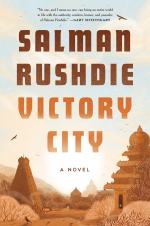|
This section contains 666 words (approx. 2 pages at 400 words per page) |

|
Victory City Summary & Study Guide Description
Victory City Summary & Study Guide includes comprehensive information and analysis to help you understand the book. This study guide contains the following sections:
This detailed literature summary also contains Quotes and a Free Quiz on Victory City by Salman Rushdie.
The following version of this book was. used to create the guide: Rushdie, Salman. Victory City. Penguin Random House LLC, 2023.
Salman Rusdie's novel Victory City toys with conventional notions of form, structure, and point of view. The novel is written from the first person plural point of view of an unidentified and indistinguishable narrator. After discovering the late Pampa Kampana's long-lost narrative poem about the Bisnaga Empire, the narrator sets out to write a more accessible and entertaining version of Pampa's account. Although Rushdie embraces temporal, linguistic, and formal inventiveness throughout his novel, the following summary relies upon a streamlined mode of explanation for the sake of clarity.
When Pampa Kampana was just nine years old, she watched her mother throw herself onto their late king's funeral pyre. In the wake of this horrific incident, a goddess inhabited Pampa's body and mind. She told Pampa that she would live for over 200 years. During this time, Pampa would birth a glorious kingdom in the very location where she had watched her mother burn. Pampa would devote herself to this kingdom, and would fight for gender equality throughout her life and until the kingdom's fall.
When Pampa encountered two cowherds, Hukka and Bukka, she gave them a satchel of magical seeds. She told them to go to the place where her mother had burned, and plant the seeds. From the seeds, a kingdom would arise. The brothers would then assume control over this kingdom.
After the brothers successfully completed their task, Pampa arrived in the new city. With their help, she named the place Victory City. Over the course of the following weeks and months, Pampa set to giving the people personal histories. She did so by whispering their stories into their dreams.
One day, a Portuguese horse trader named Domingo Nunes arrived. When he tried to say Victory City, he mispronounced it Bisnaga. Enamored with and delighted by Domingo, Pampa declared Bisnaga the official name of the empire.
Even after Pampa married Hukka and became queen, she continued the affair she had begun with Domingo. Over the following years, she gave birth to three girls, all of whom looked like Domingo.
After Hukka's death, Bukka took the throne and married Pampa. They had three sons together. However, the couple disowned them when the boys showed dissent. After Bukka's death, Pampa and her girls fled to the Forest of Women with two traveling companions. They feared what the power-hungry monk named Vidyasagar would do to them if they remained in Bisnaga.
Although the group lived a happy life in the forest, Pampa eventually had to let her daughters go and return to Bisnaga. The current king was indeed tyrannical and reversing all of Bukka's and Pampa's previously progressive measures. Not long later, however, Pampa found herself back in the forest in an attempt to help her last living daughter battle invading monkeys. After the battle, Pampa fell into a long sleep. She could only be awakened by a loving act.
Many years later, her great-great-great-great-granddaughter Zerelda Li appeared, kissed Pampa, and Pampa awoke. Together, the new companions flew back to Bisnaga disguised as birds. When the new king, Krishna, saw the women change from birds to humans, he was awed. Convinced proximity to their supernatural powers would augment his royal powers, Krishna eventually married Zerelda Li. However, he also married Tirumala to secure an alliance with her people. Zerelda Li would later die in childbirth.
While Krishna was away on military conquests, Pampa acted as Queen Regent. Upon his return, Krishna had Pampa blinded, convinced she was trying to usurp his throne.
Sensing the end of Bisnaga and her life drawing nigh, Pampa began to pen her account. Tirumala's daughter Tirumalamba became her constant companion and her scribe. On the day Bisnaga fell, Pampa helped Tirumalamba escape in the form of a bird. Just before the city began to burn, Pampa finished her account, sealed it in a pot in the ground, and died.
Read more from the Study Guide
|
This section contains 666 words (approx. 2 pages at 400 words per page) |

|



